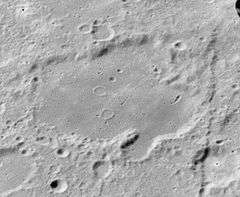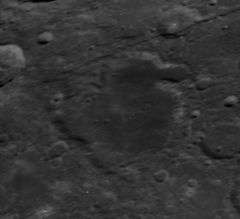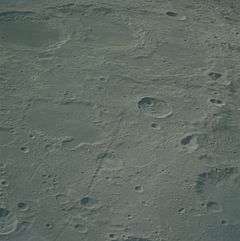Artamonov (crater)
Artamonov is a lunar impact crater that is located on the far side of the Moon. The eroded outer rim of Artamonov does not have the circular shape of most lunar craters, and instead has the overall shape of three or four merged craters. The largest of these formations is in the south, with smaller circular bulges to the north and east.
 Oblique Apollo 16 mapping camera image (facing northwest) | |
| Coordinates | 25.5°N 103.5°E |
|---|---|
| Diameter | 60 km |
| Depth | Unknown |
| Colongitude | 257° at sunrise |
| Eponym | Nikolaj N. Artamonov |


The interior floor of Artamonov has been resurfaced by subsequent flows of basaltic lava, leaving a relatively flat, featureless floor that appears darker due to lower albedo. The crater floor is faintly marked by lighter-hued ejecta from the crater Giordano Bruno to the north.
A linear formation of craters designated Catena Artamonov lies alongside the northeast rim of Artamov, following a course to the southeast. Nearby craters of note include Maxwell and Lomonosov to the northwest, and Edison to the west. To the east-northeast is the smaller crater Espin, while the small Malyy formation is located to the south-southeast.
References
- Artamonov, Gazetteer of Planetary Nomenclature, International Astronomical Union (IAU) Working Group for Planetary System Nomenclature (WGPSN)
- Andersson, L. E.; Whitaker, E. A. (1982). NASA Catalogue of Lunar Nomenclature. NASA RP-1097.CS1 maint: ref=harv (link)
- Blue, Jennifer (July 25, 2007). "Gazetteer of Planetary Nomenclature". USGS. Retrieved 2007-08-05.CS1 maint: ref=harv (link)
- Bussey, B.; Spudis, P. (2004). The Clementine Atlas of the Moon. New York: Cambridge University Press. ISBN 978-0-521-81528-4.CS1 maint: ref=harv (link)
- Cocks, Elijah E.; Cocks, Josiah C. (1995). Who's Who on the Moon: A Biographical Dictionary of Lunar Nomenclature. Tudor Publishers. ISBN 978-0-936389-27-1.CS1 maint: ref=harv (link)
- McDowell, Jonathan (July 15, 2007). "Lunar Nomenclature". Jonathan's Space Report. Retrieved 2007-10-24.CS1 maint: ref=harv (link)
- Menzel, D. H.; Minnaert, M.; Levin, B.; Dollfus, A.; Bell, B. (1971). "Report on Lunar Nomenclature by the Working Group of Commission 17 of the IAU". Space Science Reviews. 12 (2): 136–186. Bibcode:1971SSRv...12..136M. doi:10.1007/BF00171763.CS1 maint: ref=harv (link)
- Moore, Patrick (2001). On the Moon. Sterling Publishing Co. ISBN 978-0-304-35469-6.CS1 maint: ref=harv (link)
- Price, Fred W. (1988). The Moon Observer's Handbook. Cambridge University Press. ISBN 978-0-521-33500-3.CS1 maint: ref=harv (link)
- Rükl, Antonín (1990). Atlas of the Moon. Kalmbach Books. ISBN 978-0-913135-17-4.CS1 maint: ref=harv (link)
- Webb, Rev. T. W. (1962). Celestial Objects for Common Telescopes (6th revised ed.). Dover. ISBN 978-0-486-20917-3.CS1 maint: ref=harv (link)
- Whitaker, Ewen A. (1999). Mapping and Naming the Moon. Cambridge University Press. ISBN 978-0-521-62248-6.CS1 maint: ref=harv (link)
- Wlasuk, Peter T. (2000). Observing the Moon. Springer. ISBN 978-1-85233-193-1.CS1 maint: ref=harv (link)
